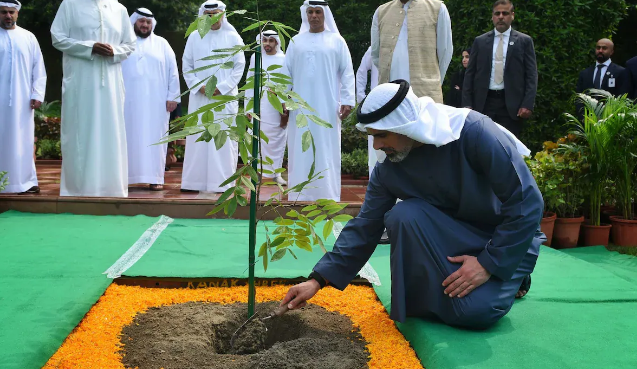In a significant gesture of continuity and respect, the Crown Prince of Abu Dhabi, Sheikh Khaled bin Mohamed bin Zayed Al Nahyan, visited Rajghat in New Delhi today. This visit, marking his first official trip to India, is noteworthy for its continuation of a unique tradition observed by UAE leaders.
During his visit, Sheikh Khaled planted an Amaltas (Cassia Fistula) sapling. This act is part of a long-standing tradition where leaders from the UAE honor Mahatma Gandhi’s legacy at Rajghat.
This tradition began in 1992 when Sheikh Zayed Bin Sultan Al Nahyan, the founding father of the UAE, planted an Amaltas sapling during his visit to India. In 2016, his successor and son, Sheikh Mohamed Bin Zayed Al Nahyan, continued this legacy by planting a Molshri (Mimusops Elengi) sapling.
Sheikh Khaled’s planting of the Amaltas sapling marks the first time in Rajghat’s history that three generations of leaders from a single country have contributed to this tradition, underscoring the deep and growing relationship between India and the UAE.
On Monday, the Crown Prince’s official visit also included meetings with key Indian leaders. He met with Prime Minister Narendra Modi at Hyderabad House, where they signed several significant agreements related to nuclear energy, Liquefied Natural Gas (LNG), oil, and food.
Following his meeting with Prime Minister Modi, Sheikh Khaled called upon President Droupadi Murmu at the Rashtrapati Bhawan. The President expressed satisfaction with the expansion of India-UAE relations through these new agreements, as stated in her update on X.
This visit not only highlights the symbolic gesture of planting a sapling but also strengthens the diplomatic and economic ties between the two nations.




